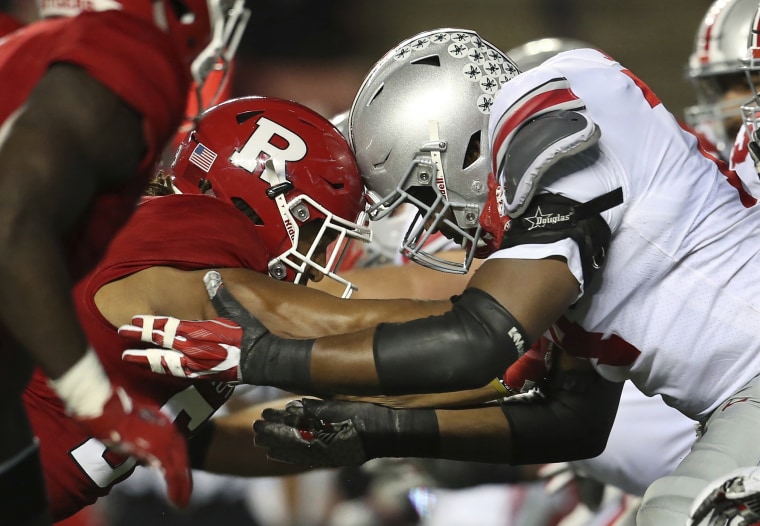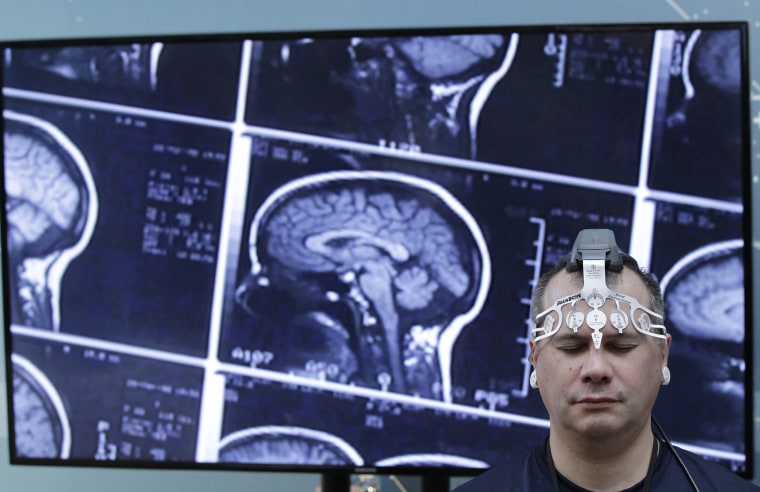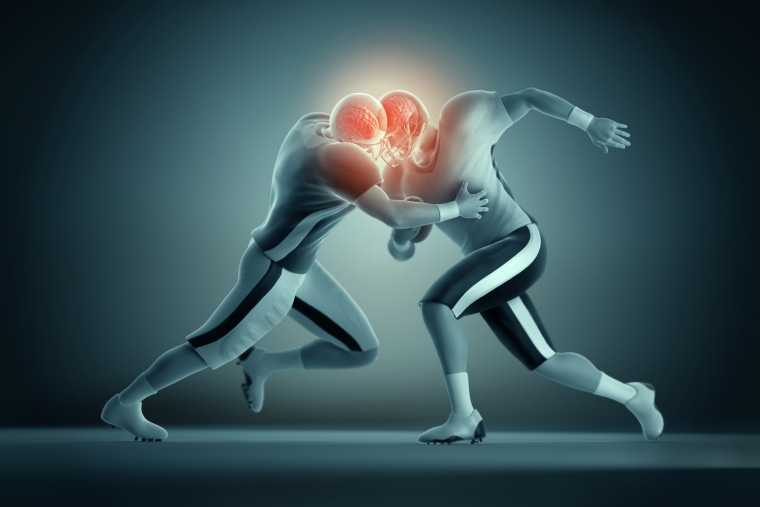Football is facing a major crisis — and not because some NFL players keep taking a knee during the National Anthem. It’s because a growing body of research shows that on-the-field collisions put players at risk for brain injury and a devastating neurological disorder known as chronic traumatic encephalopathy (CTE). One recent report found CTE in 110 of 111 former NFL players studied.
Findings like these have led some pro players to retire early. They’ve also led some parents to keep their youngsters on the sidelines. Forty-one states have seen a decline in high school football participation; some schools have shuttered their football programs entirely.
But there's also good news for players and fans. From more protective helmets to compounds that preliminary research suggests may help protect the brain, researchers are looking for ways to make football safer.
"There's not going to be one magic rule change, one magic helmet design, one magic dietary supplement that’s going to make concussions go away," says Dr. Michael Stuart, co-director of sports medicine for the Mayo Clinic. But, he says, "There is hope. I really do think there have been tremendous strides."
New helmet designs
Football is inherently violent, and an on-the-field collision can generate accelerations of up to 150 times that of gravity (150 G's). The best new helmets limit that to about 50 G's, says Dr. Stefan Duma, director of Virginia Tech’s Institute for Critical Technology and Applied Science. He’d like to see that number cut in half.

Helmet manufacturers are certainly trying. A new helmet made by Seattle-based VICIS, for example, has a soft thermoplastic outer shell that compresses like a car bumper upon impact to soften and distribute forces; inside, there's a layer of collapsible, column-shaped structures that twist and buckle to further cushion the blows. The helmet is expected to go on sale next fall.
Windpact, a Leesburg, Virginia-based company, is developing foam padding for helmets that works like an automobile airbag to absorb blows. The padding compresses to disperse energy from collisions and reinflates afterward so that the player’s head is protected from the next blow.
But even the best shock-absorbing system can't do its job if the helmet doesn't fit. And VICIS, for one, now offers its helmets not in just small, medium, or large — but in 300 different combinations. As the company's website explains, the helmet's inner lining "conforms to the player's unique head topography."
Just how good are the new helmets? It's not entirely clear. Stuart says the new helmets have yet to be fully validated, adding "I want well-designed clinical trials."
Duma doubts that any helmet can fully eliminate the risk to players' brains. "I just don’t think that’s possible," he says. "We're still going to have concussions."
Speedier diagnoses
If concussions are inevitable in football, it only makes sense to do everything possible to ensure that injured players get good care.
The NFL has skilled doctors on the sidelines to tend to injured players, but that's often not the case with high school teams, particularly in rural or low-income areas. In these settings, tablet and smartphone videoconference apps promise to be a game-changer by providing real-time medical attention to players in need.

Players can be screened for concussion on the spot — and, if necessary, sidelined to prevent subsequent impacts, which are known to be especially dangerous.
"The role telehealth will play will be significant," says Dr. Bert Vargas, director of the University of Texas Southwestern's Sports Neurology and Concussion Program. "If we could extend expertise to those [underserved] populations, it could help identify athletes' concussions and prevent further injury (due to) putting them back into play prematurely."
Can cannibis help?
Scientists are also working to develop drugs to prevent or treat concussions. Although there's no proof, some say that certain substances in marijuana, or cannabis, might be able to give football players a degree of neuroprotection.
Cannabis contains dozens of biologically active compounds known as cannabinoids, including some that preliminary research suggests may help limit the degeneration of brain tissue associated with CTE.
One 2016 study showed that the cannabinoid tetrahydrocannabinol (THC) can limit brain inflammation and the accumulation of harmful proteins in brain cells seen in people with Alzheimer's disease. "Since [Alzheimer's disease] and CTE both have a very strong inflammation component and it is known from many other studies that THC is broadly anti-inflammatory, there is a chance it may help in both conditions," Dr. Dave Schubert, a neurobiologist at the Salk Institute for Biological Studies in La Jolla, California and the senior author of the study, told NBC News MACH in an email.
Another cannabinoid that's attracted researchers' attention is cannabidiol, or CBD.
"We know that CBD is neuroprotective," Dr. Bill Kinney, chief scientific officer of the Huntington, New York-based biopharmaceutical company Kannalife, told told Sports Illustrated in 2016. "We have seen effects in both protecting against cell death and increasing cell viability...We think CBD could protect the neurons from future injury and also help them repair."
It will be years before drugs that protect the brains of football players are available, if they ever are. But as for evidence that cannabis could be the key, Dr. Jordan Tishler, a Boston emergency medicine physician who has studied cannabis and treats patients with it says, "We've got enough to pique our interest."

